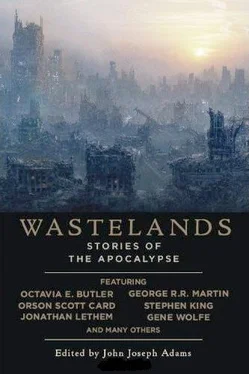And he appreciates the effort. He does. He’s flattered even. She’s an attractive woman. Intelligent, too.
The truth is, though, he’s just not interested.
She sits beside him, and all the time she’s talking. And though she doesn’t say it in so many words, what she’s talking about is Re-Populating the World and Re-establishing Western Civilization. She’s talking about Duty. She’s talking about it because that’s what you’re supposed to talk about at times like this. But underneath that is sex. And underneath that, way down, is loneliness-and he has some sympathy for that, Wyndham does. After a while, she touches Wyndham, but he’s got nothing. He might as well be dead down there.
"What’s wrong with you?" she says.
Wyndham doesn’t know how to answer her. He doesn’t know how to tell her that the end of the world isn’t about any of that stuff. The end of the world is about something else, he doesn’t have a word for it.
#
So, anyway, Wyndham’s wife.
She has another book on her night stand, too. She doesn’t read it every night, only on Sundays. But the week before the end of the world the story she was reading was the story of Job.
You know the story, right?
It goes like this: God and Satan—the Adversary, anyway; that’s probably the better translation-make a wager. They want to see just how much shit God’s most faithful servant will eat before he renounces his faith. The servant’s name is Job. So they make the wager, and God starts feeding Job shit. Takes his riches, takes his cattle, takes his health. Deprives him of his friends. On and on. Finally-and this is the part that always got to Wyndham-God takes Job’s children.
Let me clarify: In this context "takes" should be read as "kills."
You with me on this? Like Krakatoa, a volcanic island that used to exist between Java and Sumatra. On August 27, 1883, Krakatoa exploded, spewing ash fifty miles into the sky and vomiting up five cubic miles of rock. The concussion was heard 3000 miles away. It created tsunamis towering 120 feet in the air. Imagine all that water crashing down on the flimsy villages that lined the shores of Java and Sumatra.
Thirty thousand people died.
Every single one of them had a name.
Job’s kids. Dead. Just like 30,000 nameless Javanese.
As for Job? He keeps shovelling down the shit. He will not renounce God. He keeps the faith. And he’s rewarded: God gives him back his riches, his cattle. God restores his health, and sends him friends. God replaces his kids. Pay attention: Word choice is important in an end-of-the-world story.
I said "replaces," not "restores."
The other kids? They stay dead, gone, non-functioning, erased forever from the Earth, just like the dinosaurs and the 12 million undesirables incinerated by the Nazis and the 500,000 slaughtered in Rwanda and the 1.7 million murdered in Cambodia and the 60 million immolated in the Middle Passage.
That merry prankster God.
That jokester.
#
That’s what the end of the world is about, Wyndham wants to say. The rest is just details.
#
By this point the woman (You want her to have a name? She deserves one, don’t you think?) has started to weep softly. Wyndham gets to his feet and goes into the dark kitchen for another glass. Then he comes back out to the porch and makes a gin and tonic. He sits beside her and presses the cool glass upon her. It’s all he knows to do.
"Here," he says. "Drink this. It’ll help."
Song Before Sunset
by David Grigga
David Grigg is the author of just a handful of stories, which were published between 1976 and 1985. This story, the first he ever had accepted for publication, first appeared in the anthology Beyond Tomorrow , which saw him sharing a table of contents with no less than six SFWA Grand Masters. In 2004, it was performed as an audiobook by Alex Wilson of Telltale Weekly, and is included in Grigg’s story collection, Islands , which is available for free download on his website, www.rightword.com.au. Grigg has been nominated for the Australian Ditmar Awards several times, once in the short fiction category, twice as a fan writer, and once for editing the fanzine The Fanarchist .
Grigg says that the seed of the story was a line in Chekhov’s “Three Sisters” where Tuzenbach says (of one of the sisters), “Fancy being able to play so exquisitely, and yet having nobody, nobody at all to appreciate it!” It was this sad irony of wasted talent that started Grigg thinking about how the very talented might cope—or not cope—once our civilization was no more. If, as Grigg says, culture is an epiphenomenon of civilization, without civilization, would culture be entirely irrelevant?
It took him three weeks to find the sledgehammer. He was hunting rats among the broken concrete and rusted metal of an ancient supermarket. The sun was beginning to descend over the jagged horizons of the city, casting shadows like giant gravestones onto the nearer buildings. An edge of blackness had begun to creep across the rubble that was all that remained of the store.
He picked his way carefully from one piece of concrete to another, skirting the twisted metal, looking for a hole or a cover that might make a suitable nest for a brood of rats, here and there using his stick to turn over a loose chunk in the vain hope of finding a can of food undiscovered after years of looting. At his waist hung three large rats, their heads squashed and bloody from his stick. Rats were still fat and slow enough these days to be caught by surprise with a blow to the head, which was fortunate, for his eye and his skill with the slingshot he carried were not as they had once been. He rested a while, sniffing at the cold wind. There would be a frost tonight, and his bones knew fear of the cold. He was getting old.
He was sixty-five, and the years had starved him. The flesh of his youth had loosened and sagged, leaving his frame thinly draped and his eyes staring from his bony head like some curious troll.
He was sixty-five, and his hair, gray many years ago, now raised a white halo about his leather-colored face. That he had survived so long was a wonder to him, for his earlier years had not prepared him for this present world. But somehow he had learned to fight and kill and run and all else that had been necessary in the long years since the city had died.
The days now, however, were not so foul and desperate as they had once been. Now it was seldom that he feared he would starve to death. But in the bad days, like many others, he had eaten human flesh.
His name was Parnell and he had gone on living. The sun was sinking fast, and he turned about to go back before the dark could overtake him. It was as he turned that he caught the dull shine of metal in the corner of his eye. He peered more closely, put out his hand and heaved a sledgehammer up from the rubble. He swung its mass experimentally, weighed it in his hands, and felt its movement. After a moment he was forced to put it down again, as his arms began to tremble with unaccustomed strain. But no matter: given enough time, he knew this was the tool to realize the hope he had been hugging to himself for three weeks. He tied the hammer awkwardly to his belt and began to hurry home, fleeing the shadow of the city.
It was almost dark when he reached his home, a weather-stained stone house hedged around with the tangled jungle of an overgrown garden. Inside, he carefully lit each of the smoky candles in the living room, calling up a cancerous light that spread relentlessly into the corners. His door was locked and barred, and at last he sat in peace before the woodwormed piano in the main room. He sighed a little as his fingers tapped at the yellowed and splitting keys, and felt an accustomed sorrow as the fractured notes ascended. This piano had perhaps been a good learner’s instrument in its day, but time had not been kind to it. Even if he had not feared attracting the attention of the dwellers in the dark outside, the effort of playing was more agony than pleasure.
Читать дальше












